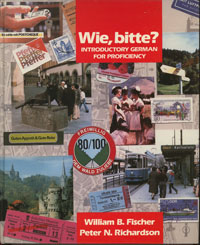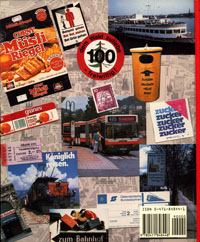| 3 • "Wie, bitte?" - Why & How | last modified: |
Goethezitat (leicht geändert): "Allein der Vortrag macht des OPI-Redners Glück."
1981: PSU FLL adopts "Deutsch für alle" (publisher: John Wiley) as text for first-year German. Inspired by departmental interest in proficiency, I created some supplementery materials for our program. Textbook rep sent them to the Wiley editor, who asked me to serve as chief editorial consultant ($12/ hr!) on the next edition.
1984: My article in Unterrichtspraxis gets invitations from 3 publishers to propose writing an intro textbook. Only the insane write textbooks alone. Pete Richardson of Linfield College becomes co-author.


Chief features:
• communicative approach
• functional-notional syllabus determines grammar and lexicon
• context/content, with an overall plot: learner enters the German-speaking world, spends a few "days" at the survival level (Aachen), then moves on to a larger setting (Köln) to approach Intermediate-Low functions, then goes to a metropolis (München) to engage in Intermediate-High activities
• "spiral syllabus" - for grammar, this means breaking up large topics suitable to linguistics books (the past tense, for example) into smaller chunks and presenting them as they map onto the acquisition of proficiency ("war-", "hatt-" early on, basic "ha- + ge-", "sein-" verbs much later).
• lower grammatical "ceiling" (Advanced-Low, to yield Intermedite-High in best students)
• rich media ("realia"), acquired by the co-authors and integrated carefully into the pedagogy AND the appearance of the book
• classroom text (hardcover) for classroom communicative activities & immediate resources, including BRIEF grammar presentations with limited technical language
• workbook for what happens outside the class, including the details of grammar
• special, generous budget ($15,000) for software, to be produced at PSU by WBF and technology-savvy German grad student (pedagogically savvy technology expert)
• extensive audio (cassette) support for "input + 1" and models of communicative, but NOT ALM drills
• "anthropological" approach to culture: daily life (which can yield deep cultural insights)
• extensive content from the "other" German-speaking countries, including DDR